名人演讲:尼克松:沉默的大多数 The Great Silent
《沉默的大多数》读后感(精选36篇)

《沉默的大多数》读后感《沉默的大多数》读后感(精选36篇)《沉默的大多数》的作者是王小波。
主要讲述了作者在该作品中倾注了其对中国民众命运的关注,以反讽和幽默的手法直面生活,从一个轻松的角度来解析身边复杂的事态。
下面是小编为你整理了“《沉默的大多数》读后感”,希望能帮助到您。
《沉默的大多数》读后感篇1《沉默的大多数》是王小波的杂文集,书中收录了作者对涉及知识分子的处境及思考、社会道德伦理、文化争论、国学与新儒家、民族主义等很多方面的一个分析和解读,角度各异,文章里既有文学上的优美,又带给人们哲学上的沉思,还有一些值得推敲的史学论述。
就像书中引述最多的罗素的那句话——参差多态乃是幸福的本源,作者给我们展示了一个丰富多彩的思想世界,并且照进作者生活过的许多现实状况。
不管是那段疯狂心酸的经历,还是现下生存的时代和空间,一切都有其存在的意义。
沉默的大多数是作者以自己为典型而揭露的人群,这些人没有语言上的障碍,但是很不擅长表达自己的想法,在很多时候都以“沉默”的姿态示人。
不知道是不是受到“沉默是金”这句话的影响,反正我身边有很大一群“沉默的大多数”,他们就是作者描述出来的样子——在公众场合什么都不说,到了私下里则妙语连珠,换言之,对性的过的人什么都说,对信不过的人什么都不说。
“沉默是金”的名言可能是很多人保持沉默的原因,而这些沉默的人需要的是打破沉默,将自己的思考和所得告诉给身边的人,否则他们也会变成“弱势群体”,因为弱势群体的典型特征就是有些话没有说出来的群体,作者在书中如是说。
“东西方精神的最大差别在于西方人沉迷于物欲,而东方人精于人与人之间的关系;前者从征服中得到满足,后者从人与人的相亲相爱中汲取幸福。
”,其实提到“物欲”,我们一定会想到许多文章,大到文学著作、各期刊杂志的文章,小到一篇普通的学生作文,“在这个物欲横流的社会”这句话不知道被多少人引述,持着或褒或贬的态度。
“物欲”是古代先贤批判的“外物所累”,是现在很多人叫嚣着的“钱,身外之物,生不带来死不带去”,对物质的追求在我们看来都是需要被批判的,因为物质索取会让精神变得不纯洁,这是传统文化潜移默化中告诉我们的。
【演讲稿范文】外国名人的演讲稿
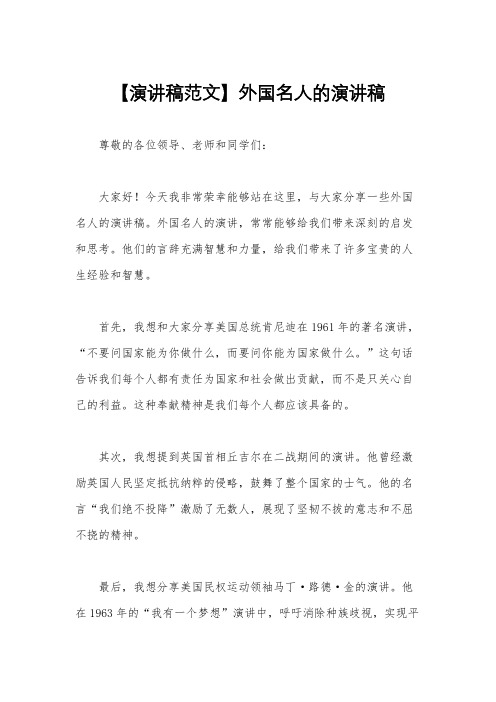
【演讲稿范文】外国名人的演讲稿尊敬的各位领导、老师和同学们:
大家好!今天我非常荣幸能够站在这里,与大家分享一些外国名人的演讲稿。
外国名人的演讲,常常能够给我们带来深刻的启发和思考。
他们的言辞充满智慧和力量,给我们带来了许多宝贵的人生经验和智慧。
首先,我想和大家分享美国总统肯尼迪在1961年的著名演讲,“不要问国家能为你做什么,而要问你能为国家做什么。
”这句话告诉我们每个人都有责任为国家和社会做出贡献,而不是只关心自己的利益。
这种奉献精神是我们每个人都应该具备的。
其次,我想提到英国首相丘吉尔在二战期间的演讲。
他曾经激励英国人民坚定抵抗纳粹的侵略,鼓舞了整个国家的士气。
他的名言“我们绝不投降”激励了无数人,展现了坚韧不拔的意志和不屈不挠的精神。
最后,我想分享美国民权运动领袖马丁·路德·金的演讲。
他在1963年的“我有一个梦想”演讲中,呼吁消除种族歧视,实现平
等和公正。
他的演讲鼓舞了全美国的民众,成为了民权运动的标志性事件。
这些外国名人的演讲,不仅给我们带来了思想的启迪,也激励了我们对于美好未来的追求。
希望我们能够从这些演讲中汲取智慧和力量,努力奋斗,为实现自己的梦想和为社会作出更大的贡献。
谢谢大家!。
1960年尼克松肯尼迪辩论 英汉
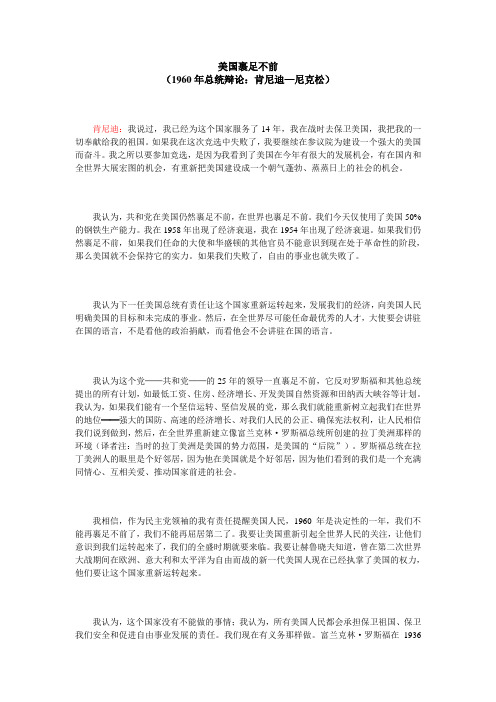
美国裹足不前(1960年总统辩论:肯尼迪—尼克松)肯尼迪:我说过,我已经为这个国家服务了14年,我在战时去保卫美国,我把我的一切奉献给我的祖国。
如果我在这次竞选中失败了,我要继续在参议院为建设一个强大的美国而奋斗。
我之所以要参加竞选,是因为我看到了美国在今年有很大的发展机会,有在国内和全世界大展宏图的机会,有重新把美国建设成一个朝气蓬勃、蒸蒸日上的社会的机会。
我认为,共和党在美国仍然裹足不前,在世界也裹足不前。
我们今天仅使用了美国50%的钢铁生产能力。
我在1958年出现了经济衰退,我在1954年出现了经济衰退。
如果我们仍然裹足不前,如果我们任命的大使和华盛顿的其他官员不能意识到现在处于革命性的阶段,那么美国就不会保持它的实力。
如果我们失败了,自由的事业也就失败了。
我认为下一任美国总统有责任让这个国家重新运转起来,发展我们的经济,向美国人民明确美国的目标和未完成的事业。
然后,在全世界尽可能任命最优秀的人才,大使要会讲驻在国的语言,不是看他的政治捐献,而看他会不会讲驻在国的语言。
我认为这个党——共和党——的25年的领导一直裹足不前,它反对罗斯福和其他总统提出的所有计划,如最低工资、住房、经济增长、开发美国自然资源和田纳西大峡谷等计划。
我认为,如果我们能有一个坚信运转、坚信发展的党,那么我们就能重新树立起我们在世界的地位——强大的国防、高速的经济增长、对我们人民的公正、确保宪法权利,让人民相信我们说到做到,然后,在全世界重新建立像富兰克林·罗斯福总统所创建的拉丁美洲那样的环境(译者注:当时的拉丁美洲是美国的势力范围,是美国的“后院”)。
罗斯福总统在拉丁美洲人的眼里是个好邻居,因为他在美国就是个好邻居,因为他们看到的我们是一个充满同情心、互相关爱、推动国家前进的社会。
我相信,作为民主党领袖的我有责任提醒美国人民,1960年是决定性的一年,我们不能再裹足不前了,我们不能再屈居第二了。
我要让美国重新引起全世界人民的关注,让他们意识到我们运转起来了,我们的全盛时期就要来临。
【名人演讲】理查德·米尔豪斯·尼克松:首任总统就职演说
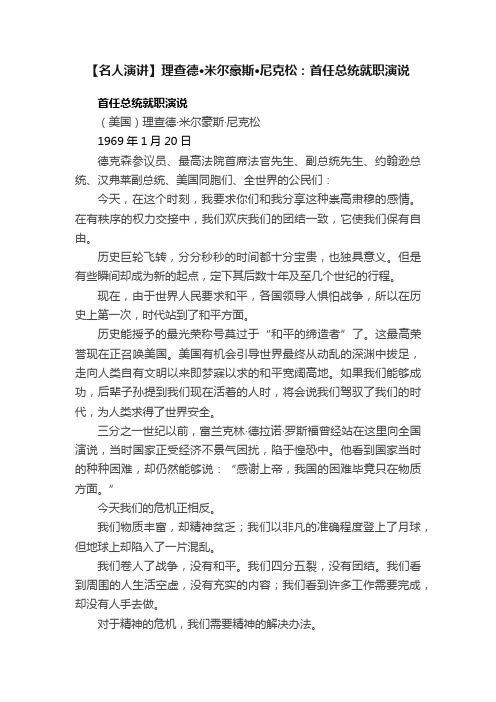
【名人演讲】理查德·米尔豪斯·尼克松:首任总统就职演说首任总统就职演说(美国)理查德·米尔豪斯·尼克松1969年1月20日德克森参议员、最高法院首席法官先生、副总统先生、约翰逊总统、汉弗莱副总统、美国同胞们、全世界的公民们:今天,在这个时刻,我要求你们和我分享这种崇高肃穆的感情。
在有秩序的权力交接中,我们欢庆我们的团结一致,它使我们保有自由。
历史巨轮飞转,分分秒秒的时间都十分宝贵,也独具意义。
但是有些瞬间却成为新的起点,定下其后数十年及至几个世纪的行程。
现在,由于世界人民要求和平,各国领导人惧怕战争,所以在历史上第一次,时代站到了和平方面。
历史能授予的最光荣称号莫过于“和平的缔造者”了。
这最高荣誉现在正召唤美国。
美国有机会引导世界最终从动乱的深渊中拔足,走向人类自有文明以来即梦寐以求的和平宽阔高地。
如果我们能够成功,后辈子孙提到我们现在活着的人时,将会说我们驾驭了我们的时代,为人类求得了世界安全。
三分之一世纪以前,富兰克林·德拉诺·罗斯福曾经站在这里向全国演说,当时国家正受经济不景气困扰,陷于惶恐中。
他看到国家当时的种种困难,却仍然能够说:“感谢上帝,我国的困难毕竟只在物质方面。
”今天我们的危机正相反。
我们物质丰富,却精神贫乏;我们以非凡的准确程度登上了月球,但地球上却陷入了一片混乱。
我们卷人了战争,没有和平。
我们四分五裂,没有团结。
我们看到周围的人生活空虚,没有充实的内容;我们看到许多工作需要完成,却没有人手去做。
对于精神的危机,我们需要精神的解决办法。
为了找到解决办法,我们只需省视自身。
当我们估量能够做什么时,我们只应许诺能做到的事。
但在制订目标时,却要有远大的理想。
如果你的邻舍没有自由,你就不会得到完全的自由。
只有共同前进才能前进。
这就是说黑人和白人共有一个国家,不是分为两个。
法律是按照我们的良心制订的。
剩下的问题就是赋予法律条文以生命:保证既然一切人在上帝面前生来就有同等的尊严,在人的面前也应有同等的尊严。
理查德尼克松的演说稿.doc

理查德尼克松的演说稿Richard M. Nixon: “Checkers”My Fellow Americans,I e before you tonight as a candidate for the Vice Presidency and as a man whose honesty and integrity has been questioned.Now, the usual political thing to do when charges are made against you is to either ignore them or to deny them without giving details. I believe we've had enough of that in the United States, particularly with the present Administration in Washington, D.C. To me the office of the Vice Presidency of the United States is a great office, and I feel that the people have got to have confidence in the integrity of the men who run for that office and who might obtain it.I have a theory, too, that the best and only answer toa smear or to an honest misunderstanding of the facts is to tell the truth. And that's why I'm here tonight. I want to tell you my side of the case. I'm sure that you have read the charge, and you've heard it, that I, Senator Nixon, took 18,000 dollars from a group of my supporters.Now, was that wrong? And let me say that it was wrong. I'm saying, incidentally, that it was wrong, not just illegal, because it isn't a question of whether it waslegal or illegal, that isn't enough. The question is, wasit morally wrong? I say that it was morally wrong if any of that 18,000 dollars went to Senator Nixon, for my personal use. I say that it was morally wrong if it was secretly given and secretly handled. And I say that it was morally wrong if any of the contributors got special favors for the contributions that they made.And now to answer those questions let me say this: Not one cent of the 18,000 dollars or any other money of that type ever went to me for my personal use. Every penny of it was used to pay for political expenses that I did not think should be charged to the taxpayers of the United States. It was not a secret fund. As a matter of fact, when I was on "Meet the Press" -- some of you may have seen it last Sunday -- Peter Edson came up to me after the program, and he said, "Dick, what about this "fund" we hear about?" And I said, "Well, there's no secret about it. Go out and see Dana Smith who was the administrator of the fund." And I gave him [Edson] his [Smith's] address. And I said you will find that the purpose of the fund simply was to defray political expenses that I did not feel should be charged to the Government.。
1960年尼克松肯尼迪辩论英汉
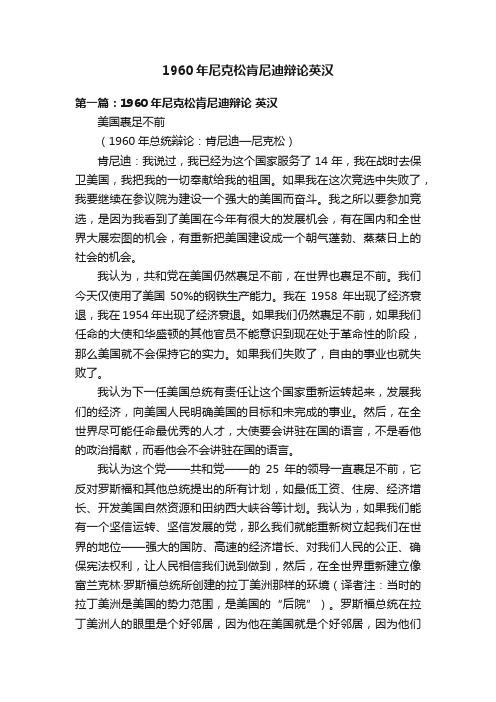
1960年尼克松肯尼迪辩论英汉第一篇:1960年尼克松肯尼迪辩论英汉美国裹足不前(1960年总统辩论:肯尼迪—尼克松)肯尼迪:我说过,我已经为这个国家服务了14年,我在战时去保卫美国,我把我的一切奉献给我的祖国。
如果我在这次竞选中失败了,我要继续在参议院为建设一个强大的美国而奋斗。
我之所以要参加竞选,是因为我看到了美国在今年有很大的发展机会,有在国内和全世界大展宏图的机会,有重新把美国建设成一个朝气蓬勃、蒸蒸日上的社会的机会。
我认为,共和党在美国仍然裹足不前,在世界也裹足不前。
我们今天仅使用了美国50%的钢铁生产能力。
我在1958年出现了经济衰退,我在1954年出现了经济衰退。
如果我们仍然裹足不前,如果我们任命的大使和华盛顿的其他官员不能意识到现在处于革命性的阶段,那么美国就不会保持它的实力。
如果我们失败了,自由的事业也就失败了。
我认为下一任美国总统有责任让这个国家重新运转起来,发展我们的经济,向美国人民明确美国的目标和未完成的事业。
然后,在全世界尽可能任命最优秀的人才,大使要会讲驻在国的语言,不是看他的政治捐献,而看他会不会讲驻在国的语言。
我认为这个党——共和党——的25年的领导一直裹足不前,它反对罗斯福和其他总统提出的所有计划,如最低工资、住房、经济增长、开发美国自然资源和田纳西大峡谷等计划。
我认为,如果我们能有一个坚信运转、坚信发展的党,那么我们就能重新树立起我们在世界的地位——强大的国防、高速的经济增长、对我们人民的公正、确保宪法权利,让人民相信我们说到做到,然后,在全世界重新建立像富兰克林·罗斯福总统所创建的拉丁美洲那样的环境(译者注:当时的拉丁美洲是美国的势力范围,是美国的“后院”)。
罗斯福总统在拉丁美洲人的眼里是个好邻居,因为他在美国就是个好邻居,因为他们看到的我们是一个充满同情心、互相关爱、推动国家前进的社会。
我相信,作为民主党领袖的我有责任提醒美国人民,1960年是决定性的一年,我们不能再裹足不前了,我们不能再屈居第二了。
名人演讲:打破沉寂
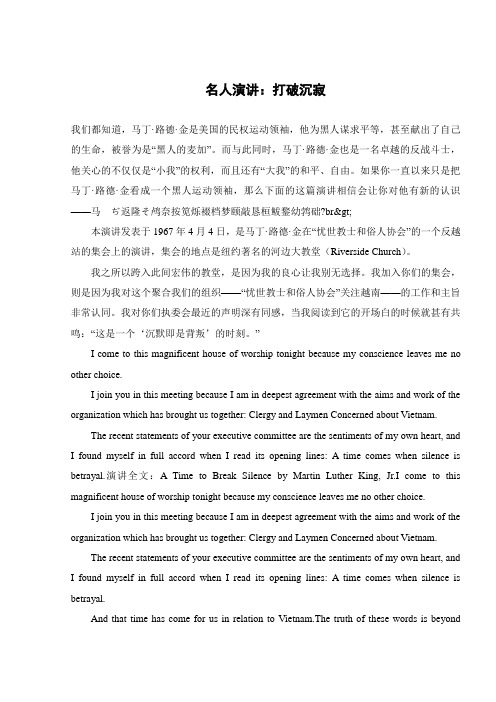
名人演讲:打破沉寂我们都知道,马丁·路德·金是美国的民权运动领袖,他为黑人谋求平等,甚至献出了自己的生命,被誉为是“黑人的麦加”。
而与此同时,马丁·路德·金也是一名卓越的反战斗士,他关心的不仅仅是“小我”的权利,而且还有“大我”的和平、自由。
如果你一直以来只是把马丁·路德·金看成一个黑人运动领袖,那么下面的这篇演讲相信会让你对他有新的认识——马ぢ返隆そ鸬奈按笕烁裰档梦颐敲恳桓鲅鍪幼鹁础?br>本演讲发表于1967年4月4日,是马丁·路德·金在“忧世教士和俗人协会”的一个反越站的集会上的演讲,集会的地点是纽约著名的河边大教堂(Riverside Church)。
我之所以跨入此间宏伟的教堂,是因为我的良心让我别无选择。
我加入你们的集会,则是因为我对这个聚合我们的组织——“忧世教士和俗人协会”关注越南——的工作和主旨非常认同。
我对你们执委会最近的声明深有同感,当我阅读到它的开场白的时候就甚有共鸣:“这是一个‘沉默即是背叛’的时刻。
”I come to this magnificent house of worship tonight because my conscience leaves me no other choice.I join you in this meeting because I am in deepest agreement with the aims and work of the organization which has brought us together: Clergy and Laymen Concerned about Vietnam.The recent statements of your executive committee are the sentiments of my own heart, and I found myself in full accord when I read its opening lines: A time comes when silence is betrayal.演讲全文:A Time to Break Silence by Martin Luther King, Jr.I come to this magnificent house of worship tonight because my conscience leaves me no other choice.I join you in this meeting because I am in deepest agreement with the aims and work of the organization which has brought us together: Clergy and Laymen Concerned about Vietnam.The recent statements of your executive committee are the sentiments of my own heart, and I found myself in full accord when I read its opening lines: A time comes when silence is betrayal.And that time has come for us in relation to Vietnam.The truth of these words is beyonddoubt, but the mission to which they call us is a most difficult one.Even when pressed by the demands of inner truth, men do not easily assume the task of opposing their governments policy, especially in time of war.Nor does the human spirit move without great difficulty against all the apathy of conformist thought within ones own bosom and in the surrounding world.Moreover, when the issues at hand seem as perplexed as they often do in the case of this dreadful conflict, we are always on the verge of being mesmerized by uncertainty; but we must move on.And some of us who have already begun to break the silence of the night have found that the calling to speak is often a vocation of agony, but we must speak.。
时代周刊经典语录

时代周刊经典语录自1923年创刊以来,时代周刊(Time)成为了全球具有影响力的批判性、新闻性和反映时代精神的期刊。
在其所发表的文章中,许多关键词、重要观点和经典语录深入人心,影响了世界各地的读者,并成为历史上不可或缺的部分,值得我们回顾、学习和探究。
以下是7个具有代表性的时代周刊经典语录案例。
1. "The American Dream"(美国梦)美国梦是美国社会文化中的核心概念,源于17世纪早期移民的追求自由、平等和成功的创业精神。
1955年5月底,时代周刊发表了一篇报道,名为"The American Dream",讨论了该概念在当时世界的吸引力和持久性。
这篇文章提出了美国梦的构成要素和挑战,它的普及和影响在国内外都有所扩大。
2. "The silent majority speaks"(沉默的大多数)在1969年,时代周刊在封面上以"The silent majority speaks"为标题,引用尼克松总统的说法,宣称这个国家中的大多数人正在保持沉默,不善于表达自己的观点。
这一概念声称杠杆作用在当时的政治和社会战略中起着重要作用。
3. "The end of certainties: Time's man of the year 1989"(确定性结束:1989年度时代的人)在1989年底,时代周刊宣布将没有一个人成为该年的Time's Person of the Year,而是将颁发一张封面,标题为"The end of certainties"。
这篇报道涉及到柏林墙的倒塌、冷战的结束和以色列和巴勒斯坦的和平协议,强调了当时重大事件的历史意义和对全球未来的影响。
4. “The best worst president”(最好的最坏总统)在2006年底,时代周刊评选了当年最有影响力的人物,题为"The best worst president",介绍了当时的美国总统乔治·沃尔克·布什。
- 1、下载文档前请自行甄别文档内容的完整性,平台不提供额外的编辑、内容补充、找答案等附加服务。
- 2、"仅部分预览"的文档,不可在线预览部分如存在完整性等问题,可反馈申请退款(可完整预览的文档不适用该条件!)。
- 3、如文档侵犯您的权益,请联系客服反馈,我们会尽快为您处理(人工客服工作时间:9:00-18:30)。
Richard M. NixonThe Great Silent Majoritydelivered 3 November 1969Good evening, my fellow AmericansTonight I want to talk to you on a subject of deep concern to all Americans and to many people in all parts of the world, the war in Vietnam.I believe that one of the reasons for the deep division about Vietnam is that many Americans have lost confidence in what their Government has told them about our policy. The American people cannot and should not be asked to support a policy which involves the overriding issues of war and peace unless they know the truth about that policy.Tonight, therefore, I would like to answer some of the questions that I know are on the minds of many of you listening to me.How and why did America get involved in Vietnam in the first place?How has this administration changed the policy of the previous Administration?What has really happened in the negotiations in Paris and on the battlefront in Vietnam?What choices do we have if we are to end the war?What are the prospects for peace?Now let me begin by describing the situation I found when I was inaugurated on January 20: The war had been going on for four years. Thirty-one thousand Americans had been killed in action. The training program for the South Vietnamese was beyond [behind] schedule. Five hundred and forty-thousand Americans were in Vietnam with no plans to reduce the number. No progress had been made at the negotiations in Paris and the United States had not put forth a comprehensive peace proposal.The war was causing deep division at home and criticism from many of our friends, as well as our enemies, abroad.In view of these circumstances, there were some who urged that I end the war at once by ordering the immediate withdrawal of all American forces. From a political standpoint, this would have been a popular and easy course to follow. After all, we became involved in the war while my predecessor was in office. I could blame the defeat, which would be the result of my action, on him -- and come out as the peacemaker. Someput it to me quite bluntly: This was the only way to avoid allowing Johnson’s war to become Nixon’s war.But I had a greater obligation than to think only of the years of my Administration, and of the next election. I had to think of the effect of my decision on the next generation, and on the future of peace and freedom in America, and in the world.Let us all understand that the question before us is not whether some Americans are for peace and some Americans are against peace. The question at issue is not whether Johnson’s war becomes Nixon’s war. The great question is: How can we win America’s peace?Well, let us turn now to the fundamental issue: Why and how did the United States become involved in Vietnam in the first place? Fifteen years ago North Vietnam, with the logistical support of Communist China and the Soviet Union, launched a campaign to impose a Communist government on South Vietnam by instigating and supporting a revolution.In response to the request of the Government of South Vietnam, President Eisenhower sent economic aid and military equipment to assist the people of South Vietnam in their efforts to prevent a Communist takeover. Seven years ago, President Kennedy sent 16,000 militarypersonnel to Vietnam as combat advisers. Four years ago, President Johnson sent American combat forces to South Vietnam.Now many believe that President Johnson’s decision to send American combat forces to South Vietnam was wrong. And many others, I among them, have been strongly critical of the way the war has been conducted.But the question facing us today is: Now that we are in the war, what is the best way to end it?In January I could only conclude that the precipitate withdrawal of all American forces from Vietnam would be a disaster not only for South Vietnam but for the United States and for the cause of peace.For the South Vietnamese, our precipitate withdrawal would inevitably allow the Communists to repeat the massacres which followed their takeover in the North 15 years before. They then murdered more than 50,000 people and hundreds of thousands more died in slave labor camps.We saw a prelude of what would happen in South Vietnam when the Communists entered the city of Hue last year. During their brief rule there, there was a bloody reign of terror in which 3,000 civilians were clubbed, shot to death, and buried in mass graves.With the sudden collapse of our support, these atrocities at Hue would become the nightmare of the entire nation and particularly for the million-and-a half Catholic refugees who fled to South Vietnam when the Communists took over in the North.For the United States this first defeat in our nation’s history would result in a collapse of confidence in American leadership not only in Asia but throughout the world.Three American Presidents have recognized the great stakes involved in Vietnam and understood what had to be done.In 1963 President Kennedy with his characteristic eloquence and clarity said,"We want to see a stable Government there," carrying on the [a] struggle to maintain its national independence." We believe strongly in that. We are not going to withdraw from that effort. In my opinion, for us to withdraw from that effort would mean a collapse not only of South Vietnam but Southeast Asia. So we’re going to stay there."President Eisenhower and President Johnson expressed the same conclusion during their terms of office.For the future of peace, precipitate withdrawal would be a disaster ofimmense magnitude. A nation cannot remain great if it betrays its allies and lets down its friends. Our defeat and humiliation in South Vietnam without question would promote recklessness in the councils of those great powers who have not yet abandoned their goals of worlds conquest. This would spark violence wherever our commitments help maintain the peace -- in the Middle East, in Berlin, eventually even in the Western Hemisphere. Ultimately, this would cost more lives. It would not bring peace. It would bring more war.For these reasons I rejected the recommendation that I should end the war by immediately withdrawing all of our forces. I chose instead to change American policy on both the negotiating front and the battle front in order to end the war fought on many fronts. I initiated a pursuit for peace on many fronts. In a television speech on May 14, in a speech before the United Nations, on a number of other occasions, I set forth our peace proposals in great detail.We have offered the complete withdrawal of all outside forces within one year. We have proposed a cease fire under international supervision. We have offered free elections under international supervision with the Communists participating in the organization and conduct of the elections as an organized political force. And the Saigon government has pledged to accept the result of the election.We have not put forth our proposals on a take-it-or-leave-it basis. We have indicated that we’re willing to discuss the proposals that have been put forth by the other side. We have declared that anything is negotiable, except the right of the people of South Vietnam to determine their own future.。
